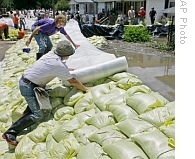VOA标准英语2008年-US Farm Belt Faces Economic Disaster From Flood
搜索关注在线英语听力室公众号:tingroom,领取免费英语资料大礼包。
(单词翻译)
By Greg Flakus
Council Bluffs1, Iowa
20 June 2008
Surging water is moving down the Mississippi river devastating2 towns and farmland along the way. The river has topped close to a dozen levees flooding towns in Iowa, Illinois and Missouri and residents farther downstream are bracing3 for the surge as it heads their way. VOA's Greg Flakus has more from Council Bluffs, Iowa.
 |
| Doug Smith and Debbie Hall put a protective cover over the sandbag levee being built around the town of in Hamburg, Illinois, 20 June 2008 |
Residents are returning to their homes in some parts of Iowa and farmers are trying to determine if they can salvage4 fields that were flooded soon after being planted. President Bush toured the disaster area Friday as did presidential candidates, Senator John McCain, the presumptive Republican candidate, and Senator Barack Obama, the likely Democratic candidate.
But even as citizens began the clean up process in Iowa, assisted by the National Guard and relief agencies, people farther downstream were fleeing the raging water.
In Foley, Missouri, John Watson spoke5 to reporters from the roof of his home.
"There is nothing you can do, just sit there and watch it come at you. Get everything out you can," he said.
But the people whose homes have been flooded are not the only ones likely to feel pain from this disaster. A lot of valuable farmland has been flooded destroying crops of corn, wheat and soybeans that had been planted in recent weeks. This is the heart of the U.S. grain-producing region and the losses in the flood zone will surely cause higher food prices worldwide.
Corn hit a record price of $8 a bushel earlier this week and some analysts6 believe it will move higher once the full extent of the damage to farmland is known. Losses in Iowa alone are estimated at $2.7 billion. For farmers in the northern part of the flood zone it may be too late to replant since there are not enough days left in the growing season to bring a crop to harvest. But even many farmers who would like to replant there is pessimism7. Many of them say the ground is too soggy for them to enter the fields with tractors and other equipment.
But even after fields are totally drained farmers will face the problem of silt8 and contaminated material that washed over their land with the floodwaters. It may take years for some areas to recover completely.
The floods have also disrupted other economic activity in the area. Tourism has fallen even in areas unaffected by flooding because people are avoiding travel to the Mississippi river area in general. Barge9 traffic on the Mississippi has been slowed as well.
Officials say this year's floods will likely surpass the devastation10 of the 1993 floods in the region, which resulted in losses of over $20 billion.
 收听单词发音
收听单词发音 




